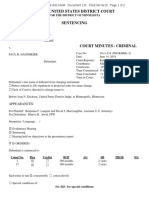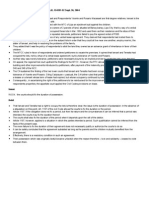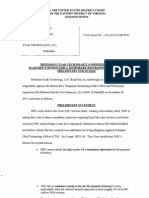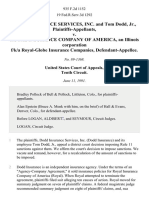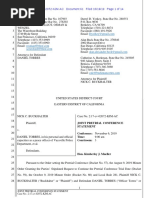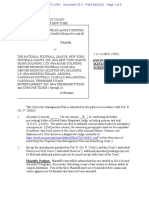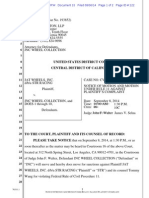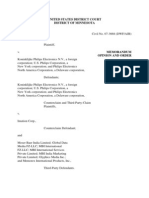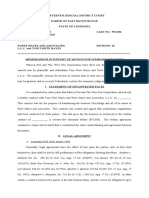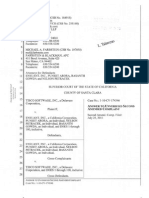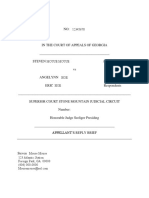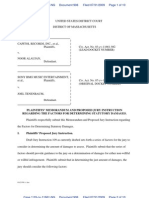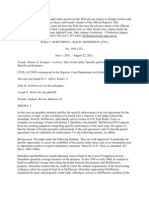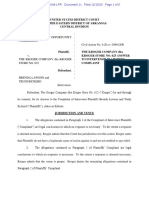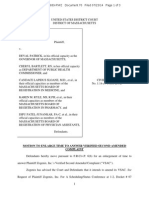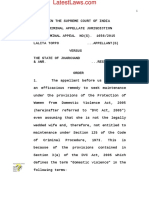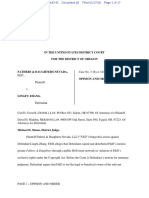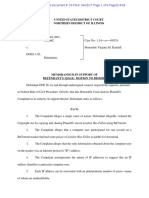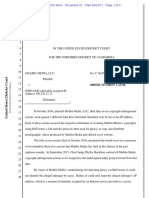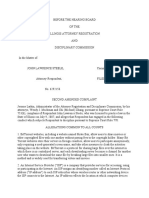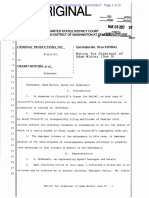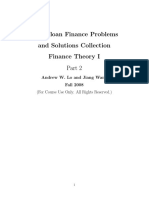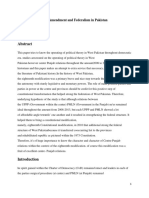310-Cv-03647-WHA Docket 65 Order Granting Default
310-Cv-03647-WHA Docket 65 Order Granting Default
Uploaded by
J DoeCopyright:
Available Formats
310-Cv-03647-WHA Docket 65 Order Granting Default
310-Cv-03647-WHA Docket 65 Order Granting Default
Uploaded by
J DoeOriginal Description:
Copyright
Available Formats
Share this document
Did you find this document useful?
Is this content inappropriate?
Copyright:
Available Formats
310-Cv-03647-WHA Docket 65 Order Granting Default
310-Cv-03647-WHA Docket 65 Order Granting Default
Uploaded by
J DoeCopyright:
Available Formats
Case3:10-cv-03647-WHA Document65
Filed10/07/11 Page1 of 6
1 2 3 4 5 6 7 FOR THE NORTHERN DISTRICT OF CALIFORNIA 8 9 10 IO GROUP, INC. d/b/a TITAN MEDIA, a California corporation, No. C 10-03647 WHA Plaintiff, v. MARIUSZ PRALAT, CAROL B. PEAL, YUNSHU KANG, CHUN RONG ZHENG, ZHI NENG WU, RUBEN MORENO, HAO XU, CHIAFEN LIN, SANG YEOL KIM, and MALGORZATA FRACZYK, individuals, Defendants. / INTRODUCTION In this copyright-infringement action, plaintiff moves for default judgment against the two remaining defendants. For the following reasons, plaintiffs motion is GRANTED. STATEMENT Plaintiff commenced this action against 244 Doe defendants in August 2010. Plaintiff produces, markets, and distributes adult entertainment products, including videos. Plaintiff operates and maintains a website by and through which customers paying a monthly subscription fee may view Plaintiffs photographic and audiovisual works. In 2007, plaintiff created the movie Breakers, which allegedly is of high production value and is easily discernible ORDER GRANTING PLAINTIFFS MOTION FOR DEFAULT JUDGMENT IN THE UNITED STATES DISTRICT COURT
United States District Court
11
For the Northern District of California
12 13 14 15 16 17 18 19 20 21 22 23 24 25 26 27 28
Case3:10-cv-03647-WHA Document65
Filed10/07/11 Page2 of 6
1 2 3 4 5 6 7 8 9 10
as a professional work. Plaintiff holds a copyright registration certificate from the United States Copyright Office for Breakers (First Amd. Compl. 5, 22, 33; Ruoff Decl. Exh. A). Defendants are allegedly participants in the eDonkey2000 network, a peer-to-peer file sharing system. The eDonkey2000 Network allows users simultaneously to download and upload pieces of a file from multiple peers. Plaintiff alleges that defendants used this network to engage in a copyright infringement scheme together. During the months of April, May, and June 2010, they all reproduced, shared, distributed, and republished the same file . . . containing Plaintiffs motion picture, Breakers (First Amd. Compl. 10, 24). Defendants Mariusz Pralat and Malgorzata Fraczyk were served with the first amended complaint and summons on May 25, 2011, alleging (1) copyright infringement, (2) contributory copyright infringement, (3) vicarious copyright infringement, (4) negligence, and (5) civil conspiracy. Pralat and Fraczyk failed to answer the complaint or to otherwise make appearances in this action. On July 20, 2011, the Clerk of the Court entered default as to defendants Pralat and Fraczyk, the last two defendants remaining in this action (Dkt. Nos. 52, 55). Plaintiff now moves for default judgment against Pralat and Fraczyk, jointly and severally, for the maximum statutory damages of $30,000 for infringing its copyright in Breakers. Defendants were served with copies of this motion, but neither defendant filed an opposition. A hearing on the instant motion was held on October 6. Defendants did not appear at the hearing, either personally or through counsel. At the hearing, plaintiffs counsel said after serving the defendants with this motion, one packet was returned to him as undeliverable. Counsel also stated that he previously spoke on the phone with that defendant, and that defendant was made aware of the present action by service of the summons and the complaint. ANALYSIS Pursuant to FRCP 55(a), a default judgment can be entered [w]hen a party against whom a judgment for affirmative relief is sought has failed to plead or otherwise defend. Although there is a general rule that default judgments are ordinarily disfavored, the factors to consider when exercising discretion as to the entry of a default judgment are: (1) the possibility of prejudice to the plaintiff; (2) the merits of the plaintiffs substantive claim; (3) the sufficiency 2
United States District Court
11
For the Northern District of California
12 13 14 15 16 17 18 19 20 21 22 23 24 25 26 27 28
Case3:10-cv-03647-WHA Document65
Filed10/07/11 Page3 of 6
1 2 3 4 5 6 7
of the complaint; (4) the sum of money at stake in the action; (5) the possibility of a dispute concerning material facts; (6) whether the default was due to excusable neglect; and (7) the strong policy underlying the Federal Rules of Civil Procedure favoring decisions on the merits. Eitel v. McCool, 782 F.2d 1470, 147172 (9th Cir. 1986). In the present action, these factors weigh in favor of the entry of default judgment against defendants Pralat and Fraczyk. 1. MERITS OF PLAINTIFFS SUBSTANTIVE CLAIMS AND SUFFICIENCY OF THE COMPLAINT.
The general rule is that upon default the factual allegations of the complaint, except those 8 relating to the amount of damages, will be taken as true. Geddes v. United Fin. Group, 559 F.2d 9 557, 560 (9th Cir. 1977). Thus, this order considers the merits of plaintiffs substantive claims, 10 the sufficiency of the complaint, and the possibility of a dispute concerning the material facts
United States District Court
11 together. All three of these factors weigh in favor of entering default judgment against the two
For the Northern District of California
12 remaining defendants. Because plaintiff only addresses and seeks damages for direct copyright 13 infringement in its brief, this order too only reaches plaintiffs claim for direct infringement. 14 Plaintiff alleges that defendants infringed its copyright in the movie Breakers in violation 15 of Section 501 of Title 17 of the United States Code. Section 501(a) states: Anyone who 16 violated any of the exclusive rights of the copyright owner as provided by sections 106 through 17 122 . . . is an infringer of the copyright. In order to state a claim for copyright infringement, 18 plaintiff must show (1) that it owns a valid copyright in the allegedly infringed material, and 19 (2) that defendants violated an exclusive right granted to the copyright owner. The exclusive 20 rights of the copyright owner are enumerated in Section 106 and include to reproduce the 21 copyrighted work in copies or phonorecords and to distribute copies or phonorecords of the 22 copyrighted work to the public by sale or other transfer of ownership, or by rental, lease, or 23 lending. 17 U.S.C. 106(1), (3). 24 The operative complaint alleges that plaintiff holds a copyright registration certificate 25 from the United States Copyright Office for the 2007 movie Breakers. The registration certificate 26 is also attached as exhibit A to the Ruoff declaration. Under our copyright laws, a registration 27 certificate constitutes prima facie evidence of a valid copyright, and shifts the burden to the 28 opposing party to prove the invalidity of the copyright. Entm't Research Group, Inc. v. Genesis 3
Case3:10-cv-03647-WHA Document65
Filed10/07/11 Page4 of 6
1 2 3 4 5 6 7 8 9 10
Creative Group, Inc., 122 F.3d 1211, 1217 (9th Cir. 1997). Defendants have not offered any evidence to rebut the presumption created by plaintiffs copyright registration certificate that plaintiffs copyright in Breakers is valid. Plaintiff further asserts that defendants reproduced and distributed its copyrighted work, Breakers, by and through the eDonkey2000 peer-to-peer network without authorization (First Amd. Compl. 3334). Plaintiff has pled facts to demonstrate defendants violated its exclusive rights as the copyright owner of Breakers. Taking the factual allegations of the complaint as true, plaintiff has sufficiently pled facts establishing a copyright infringement claim against defendants. These factors weigh in favor of entering default judgment against defendants. 2. FOUR REMAINING EITEL FACTORS.
United States District Court
11
For the Northern District of California
The remaining Eitel factors the possibility of prejudice to the plaintiff, the sum of money at stake, whether the default was due to excusable neglect, and the strong policy underlying the FRCP favoring decisions on the merits also favor entry of default judgment against defendants Pralat and Fraczyk. First, plaintiff would be prejudiced if default judgment were not entered against defendants. This would allow their alleged infringing conduct to continue undeterred and leave plaintiff without recourse against them or a way to recoup lost profits. Second, the maximum amount of damages sought by plaintiff is $30,000. This is substantially less than the $3 million in damages at stake in Eitel. Third, defendants have been served with the complaint and summons, as well as numerous other documents in this action, but have failed to make an appearance. No oppositions to this motion were filed, and defendants did not appear at the hearing. Excusable neglect is thus unlikely. Fourth, FRCP 55(a) provides for a default judgment to be entered in circumstances where the defendants fail to appear, such as here. The fact that defendants refuse to participate in the judicial process renders a decision on the merits virtually impossible. Accordingly, the seven Eitel factors all weigh in favor of granting default judgment against the two remaining defendants.
12 13 14 15 16 17 18 19 20 21 22 23 24 25 26 27 28
Case3:10-cv-03647-WHA Document65
Filed10/07/11 Page5 of 6
1 2 3 4 5 6 7 8 9 10
3.
DAMAGES.
The owner of a copyright is entitled to recover the actual damages suffered as a result of a copyright infringement in addition to any profits earned by the copyright infringer. 17 U.S.C. 504(a). In the alternative, the copyright owner may elect, at any time before final judgment is rendered, to recover, instead of actual damages and profits, an award of statutory damages for all infringements involved in the action, with respect to any one work, for which any one infringer is liable individually, or for which any two or more infringers are liable jointly and severally, in a sum of not less than $750 or more than $30,000 as the court considers just. 17 U.S.C. 504(c)(1). Plaintiff requests $30,000 in damages, the maximum statutory damages award permissible for the copyright infringement of one work, when willfulness is not established. District courts have wide discretion in determining the amount of statutory damages to be awarded, constrained only by the specified maxima and minima. Harris v. Emus Records Corp., 734 F.2d 1329, 1335 (9th Cir. 1984). The maximum statutory damages award for the infringement of Breakers is $30,000 and the minimum is $750. In determining the amount of damages to award, the court is guided by what is just in the particular case, considering the nature of the copyright, the circumstances of the infringement and the like, . . . but with the express qualification that in every case the assessment must be within the prescribed [maximum or minimum]. Within these limitations the court's discretion and sense of justice are controlling. Peer Intl Corp. v. Pausa Records, Inc., 909 F.2d 1332, 1336 (9th Cir. 1990) (internal citation
United States District Court
11
For the Northern District of California
12 13 14 15 16 17 18 19 20 21
omitted). Moreover, the statutory rule is designed to discourage wrongful conduct. F. W. 22 Woolworth Co. v. Contemporary Arts, 344 U.S. 228, 233 (1952). Even for uninjurious and 23 unprofitable invasions of copyright the court may, if it deems it just, impose a liability within 24 statutory limits to sanction and vindicate the statutory policy. Ibid. 25 Plaintiff seeks the maximum statutory damages because its works are valuable and 26 defendants acts harmed and continue to harm the value of its works. Plaintiff alleged that its 27 works, including Breakers, are of high quality, and plaintiff has won numerous awards for its 28 productions. Attachments to the Ruoff declaration show that the suggested retail price of a 5
Case3:10-cv-03647-WHA Document65
Filed10/07/11 Page6 of 6
1 2 3 4 5 6 7 8 9 10
3-Disc Combo Pack of Breakers retails on its website for $49.95. In addition, a monthly subscription to plaintiffs website costs $29.95. As plaintiffs exhibits demonstrate, the prices for plaintiffs films and website featuring adult content are higher than the prices for non-erotic films. Furthermore, plaintiff considers online piracy to be the single greatest threat to the continued viability of its business because it threatens to reduce future sales and memberships to its website (Ruoff Decl. 11, Exhs. BE). Moreover, Defendants caused Plaintiff harm by reproducing and distributing Plaintiffs works with no digital protection systems, thereby making it possible for the unending and continual distribution of Breakers, by and through peer-to-peer networks (Br. 5; Ruoff Decl. 10). Due to the type of infringement committed by defendants, there could be an infinite number of potential customers of plaintiff who are instead viewing Breakers without any compensation to plaintiff. There is no evidence, however, that defendants profited from their infringement in any way. Nor were defendants the creators or owners of the eDonkey2000 network used to infringe plaintiffs works; they were mere users of the infringing website. Although the conduct of defendants was damaging to plaintiffs business, it was not so egregious as to warrant the maximum damages award under the statute. This order finds that the extensiveness and continuity of the infringement of Breakers has caused substantial harm to plaintiff, and an award of $20,000 against defendants jointly and severally is appropriate. CONCLUSION For the foregoing reasons, plaintiffs motion for default judgment against defendants Pralat and Fraczyk, jointly and severally for the amount of $20,000, is GRANTED.
United States District Court
11
For the Northern District of California
12 13 14 15 16 17 18 19 20 21 22 23 24 25 26
IT IS SO ORDERED. Dated: October 7, 2011.
27 28 6
WILLIAM ALSUP UNITED STATES DISTRICT JUDGE
You might also like
- Kiss of The Fur Queen by Tomson HighwayDocument3 pagesKiss of The Fur Queen by Tomson HighwayRehana PillayNo ratings yet
- De Havilland Motion For Trial SettingDocument10 pagesDe Havilland Motion For Trial SettingTHROnlineNo ratings yet
- 2016-07-18 Motion For Temporary Restraining Order (00238839xC217C)Document16 pages2016-07-18 Motion For Temporary Restraining Order (00238839xC217C)paul weichNo ratings yet
- JetSmarter v. BensonDocument227 pagesJetSmarter v. BensonJetsmarter LitNo ratings yet
- Clay Nutting, TBD Fest LawsuitDocument8 pagesClay Nutting, TBD Fest LawsuitCapital Public RadioNo ratings yet
- Beta Nightclub Order To Show CauseDocument18 pagesBeta Nightclub Order To Show CauseMichael_Roberts2019No ratings yet
- Gov Uscourts Wawd 177098 1 0Document52 pagesGov Uscourts Wawd 177098 1 0eriqgardnerNo ratings yet
- MND 16-Cr-00334-Jne-kmm Document 135Document2 pagesMND 16-Cr-00334-Jne-kmm Document 135J DoeNo ratings yet
- CAND 16 CV 05975 WHA Document 27 3Document798 pagesCAND 16 CV 05975 WHA Document 27 3J DoeNo ratings yet
- PAED 12-Cv-02078-MMB Document 190Document1 pagePAED 12-Cv-02078-MMB Document 190J DoeNo ratings yet
- Macasaet Vs Macasaet DigestDocument1 pageMacasaet Vs Macasaet DigestRyan Suaverdez50% (2)
- Petition for Certiorari Denied Without Opinion: Patent Case 98-1972.From EverandPetition for Certiorari Denied Without Opinion: Patent Case 98-1972.No ratings yet
- Petition for Certiorari: Denied Without Opinion Patent Case 93-1413From EverandPetition for Certiorari: Denied Without Opinion Patent Case 93-1413No ratings yet
- BARNETT V DUNN, Et Al. - General Denial - DefaultDMSDocument4 pagesBARNETT V DUNN, Et Al. - General Denial - DefaultDMSJack RyanNo ratings yet
- Eyaktek Opposition To MotionDocument19 pagesEyaktek Opposition To Motionndc_exposedNo ratings yet
- YaVaughnie Wilkins BankruptcyDocument8 pagesYaVaughnie Wilkins BankruptcyCalifornia Public Access100% (1)
- Dodd Insurance Services, Inc. and Tom Dodd, Jr. v. Royal Insurance Company of America, An Illinois Corporation F/k/a Royal-Globe Insurance Companies, 935 F.2d 1152, 10th Cir. (1991)Document11 pagesDodd Insurance Services, Inc. and Tom Dodd, Jr. v. Royal Insurance Company of America, An Illinois Corporation F/k/a Royal-Globe Insurance Companies, 935 F.2d 1152, 10th Cir. (1991)Scribd Government DocsNo ratings yet
- Nike v. MSCHF - Order To Show Cause Re PIDocument5 pagesNike v. MSCHF - Order To Show Cause Re PISarah BursteinNo ratings yet
- Proposed Judgment and Permanent Injunction - Ubisoft DDOSDocument3 pagesProposed Judgment and Permanent Injunction - Ubisoft DDOSHunter CookeNo ratings yet
- Middlesex Mutual Insurance Company v. Stuart Levine, 675 F.2d 1197, 11th Cir. (1982)Document11 pagesMiddlesex Mutual Insurance Company v. Stuart Levine, 675 F.2d 1197, 11th Cir. (1982)Scribd Government DocsNo ratings yet
- Laborers Health and Welfare Trust Fund for Northern California Laborers Vacation-Holiday Trust Fund for Northern California Laborers Pension Trust Fund for Northern California Laborers Training and Retraining Trust Fund for Northern California v. Westlake Development, a Corporation First Doe Second Doe Third Doe Black Corporation White Corporation Blue Co. And Grey Company, a Corporation, Westlake Development Company, Inc., Petitioner-Counter-Respondent-Appellee v. Local 389 Laborers Union Northern California District Council of Laborers, Respondents-Counter-Petitioners-Appellants, 53 F.3d 979, 1st Cir. (1995)Document9 pagesLaborers Health and Welfare Trust Fund for Northern California Laborers Vacation-Holiday Trust Fund for Northern California Laborers Pension Trust Fund for Northern California Laborers Training and Retraining Trust Fund for Northern California v. Westlake Development, a Corporation First Doe Second Doe Third Doe Black Corporation White Corporation Blue Co. And Grey Company, a Corporation, Westlake Development Company, Inc., Petitioner-Counter-Respondent-Appellee v. Local 389 Laborers Union Northern California District Council of Laborers, Respondents-Counter-Petitioners-Appellants, 53 F.3d 979, 1st Cir. (1995)Scribd Government DocsNo ratings yet
- PRETRIAL STATEMENT Nick Buckhalter Tight Handcuffing CaseDocument14 pagesPRETRIAL STATEMENT Nick Buckhalter Tight Handcuffing Casewolf woodNo ratings yet
- NFL's Proposed Case Management Plan Filing in Brian Flores LawsuitDocument6 pagesNFL's Proposed Case Management Plan Filing in Brian Flores LawsuitAnthony J. PerezNo ratings yet
- Opp To Motion To Quash (Bookmarked) PDFDocument44 pagesOpp To Motion To Quash (Bookmarked) PDFGeorge SharpNo ratings yet
- Justin Bannan: Motion To Stay Civil ProceedingsDocument11 pagesJustin Bannan: Motion To Stay Civil ProceedingsMichael_Roberts2019No ratings yet
- Motion To Dismiss SFRX V TorresDocument4 pagesMotion To Dismiss SFRX V TorressmallcapsmarketNo ratings yet
- 5-8-08 Molfetti Petition To Confirm Arb. Award - MMDocument5 pages5-8-08 Molfetti Petition To Confirm Arb. Award - MMDelilah SongNo ratings yet
- USA v. Flynn - DOJ - Government Notice of Claims - 10.29.19Document5 pagesUSA v. Flynn - DOJ - Government Notice of Claims - 10.29.19Washington ExaminerNo ratings yet
- Funimation Notice of HearingDocument2 pagesFunimation Notice of HearingBICRNo ratings yet
- JAT v. JNC - Rule 11 MotionDocument227 pagesJAT v. JNC - Rule 11 MotionSarah BursteinNo ratings yet
- Imation v. Philips 12 (C) OpinionDocument21 pagesImation v. Philips 12 (C) Opinionpropertyintangible100% (1)
- 9th Circuit Appeal - DKT 3 - Requests For Judicial Notice (Combined)Document20 pages9th Circuit Appeal - DKT 3 - Requests For Judicial Notice (Combined)Honor in JusticeNo ratings yet
- TWC Motion To ContinueDocument13 pagesTWC Motion To ContinueTHROnlineNo ratings yet
- Larry Hagman's Memo Opposing Citigroup's PetitionDocument19 pagesLarry Hagman's Memo Opposing Citigroup's PetitionDealBookNo ratings yet
- Order - Set Aside Default&JTDocument2 pagesOrder - Set Aside Default&JTBiloxiMarxNo ratings yet
- United States Court of Appeals, Eleventh CircuitDocument10 pagesUnited States Court of Appeals, Eleventh CircuitScribd Government DocsNo ratings yet
- Puente - Arizona - Et - Al - v. - Arpai RESPONSE To Motion Re MOTION For Summary Judgment County Defendants' Joint Response in Opposition To Plaintiffs' Motion For Partial Summary JudgmentDocument36 pagesPuente - Arizona - Et - Al - v. - Arpai RESPONSE To Motion Re MOTION For Summary Judgment County Defendants' Joint Response in Opposition To Plaintiffs' Motion For Partial Summary JudgmentChelle CalderonNo ratings yet
- Motion For Summary JudgmentDocument4 pagesMotion For Summary JudgmentJoe DonahueNo ratings yet
- Affirmation in Support of Plaintiff's Motion To Compel Defendant To Serve Response To Plaintiff's Document Demand and To Produce Responsive Documents and Affirmation of Good Faith Pursuant To S 202.7Document9 pagesAffirmation in Support of Plaintiff's Motion To Compel Defendant To Serve Response To Plaintiff's Document Demand and To Produce Responsive Documents and Affirmation of Good Faith Pursuant To S 202.7Christina Wilkinson100% (1)
- Answer To Second Amended ComplaintDocument7 pagesAnswer To Second Amended Complaintresilienara9788No ratings yet
- Steven Mouse Appellant v. The Hoes in GA Court of AppealsDocument20 pagesSteven Mouse Appellant v. The Hoes in GA Court of AppealsJanet and JamesNo ratings yet
- Plaintiffs' Proposed Jury Instructions Re Statutory DamagesDocument10 pagesPlaintiffs' Proposed Jury Instructions Re Statutory DamagesBen Sheffner100% (2)
- Federal Litigation Document Collection For SaleDocument4 pagesFederal Litigation Document Collection For SaleStan BurmanNo ratings yet
- Attorneys For PlaintiffsDocument16 pagesAttorneys For PlaintiffsEquality Case FilesNo ratings yet
- Hurtubise V McPherson CaseDocument5 pagesHurtubise V McPherson CaseRichard Vetstein100% (1)
- Cockerham Kimberly V. Dr. Kelledy Patrick MDDocument19 pagesCockerham Kimberly V. Dr. Kelledy Patrick MDTami2020100% (1)
- 11 Answer To Intervenor ComplaintDocument6 pages11 Answer To Intervenor ComplaintRicca PrasadNo ratings yet
- Donovan, Raymond J., Secretary of Labor, United States Department of Labor v. Spadea, Samuel, 757 F.2d 74, 3rd Cir. (1985)Document6 pagesDonovan, Raymond J., Secretary of Labor, United States Department of Labor v. Spadea, Samuel, 757 F.2d 74, 3rd Cir. (1985)Scribd Government DocsNo ratings yet
- United States Court of Appeals For The Tenth CircuitDocument7 pagesUnited States Court of Appeals For The Tenth Circuitdillon-richardsNo ratings yet
- Fresno Cannabis Lawsuit - Ex Parte ApplicationDocument3 pagesFresno Cannabis Lawsuit - Ex Parte ApplicationBud GreenNo ratings yet
- Notice of Taking Deposition of Person Most Qualified With Production of DocumentsDocument2 pagesNotice of Taking Deposition of Person Most Qualified With Production of DocumentsWilliam A. DanielsNo ratings yet
- July23 Motion To Enlarge Time To Answer Verified Second Amended Complaint Filed by Deval PatrickDocument3 pagesJuly23 Motion To Enlarge Time To Answer Verified Second Amended Complaint Filed by Deval PatrickkevgoNo ratings yet
- 12 - 01 - 2014 ANTI SLAPP MOTION CCP 425.16 - Waszczuk v. UC RegentsDocument200 pages12 - 01 - 2014 ANTI SLAPP MOTION CCP 425.16 - Waszczuk v. UC RegentsJerry VashchookNo ratings yet
- SC Judgement That Live-In Partner Can Seek Maintenance Under The Domestic Violence Act, 2005Document6 pagesSC Judgement That Live-In Partner Can Seek Maintenance Under The Domestic Violence Act, 2005Latest Laws Team100% (1)
- 85 MainPrenda CAND Motion For Attorneys' Fees: Renallo DeclarationDocument4 pages85 MainPrenda CAND Motion For Attorneys' Fees: Renallo DeclarationAdam Steinbaugh100% (1)
- Rizona Ourt of Ppeals: Plaintiffs/Appellants/Cross-Appellees, VDocument11 pagesRizona Ourt of Ppeals: Plaintiffs/Appellants/Cross-Appellees, VScribd Government DocsNo ratings yet
- Monique Rathbun V Scientology Motion To Compel and For ContinuanceDocument7 pagesMonique Rathbun V Scientology Motion To Compel and For ContinuancesnippyxNo ratings yet
- Ex Parte Leave To FileDocument8 pagesEx Parte Leave To FileChrista SinghNo ratings yet
- Motion To Reconsider Sanctions - Chelsea E. Manning Grand Jury ResistanceDocument15 pagesMotion To Reconsider Sanctions - Chelsea E. Manning Grand Jury ResistanceKelly WrightNo ratings yet
- Motion To File Second Amended ComplaintDocument12 pagesMotion To File Second Amended ComplaintShane Vander HartNo ratings yet
- Lancaster County Court of Common Pleas Criminal Division - Clerk of CourtDocument8 pagesLancaster County Court of Common Pleas Criminal Division - Clerk of CourtStan J. CaterboneNo ratings yet
- Stillman OrderDocument40 pagesStillman OrderJohn ByrneNo ratings yet
- Subaru's Motion To Dismiss, Rob Weir's Statement and ExhibitsDocument54 pagesSubaru's Motion To Dismiss, Rob Weir's Statement and ExhibitsGizmodo EditNo ratings yet
- Petition for Certiorari Denied Without Opinion: Patent Case 93-1518From EverandPetition for Certiorari Denied Without Opinion: Patent Case 93-1518No ratings yet
- ORD 17 CV 00158 SB Document 36Document11 pagesORD 17 CV 00158 SB Document 36J DoeNo ratings yet
- 15-cr-20382-VAR-MKM ECF No. 168Document7 pages15-cr-20382-VAR-MKM ECF No. 168J DoeNo ratings yet
- MND 16-Cr-00334-Jne-kmm Document 162Document7 pagesMND 16-Cr-00334-Jne-kmm Document 162J DoeNo ratings yet
- ORD 16-Cv-01443 Document 46Document17 pagesORD 16-Cv-01443 Document 46J DoeNo ratings yet
- In The United States District Court For The District of OregonDocument12 pagesIn The United States District Court For The District of OregonJ DoeNo ratings yet
- Ca9 17-35041 37-1Document14 pagesCa9 17-35041 37-1J DoeNo ratings yet
- Filed: Not For PublicationDocument7 pagesFiled: Not For PublicationJ DoeNo ratings yet
- WAWD 17-cv-00099 2017-05-15 Letter To LoweDocument5 pagesWAWD 17-cv-00099 2017-05-15 Letter To LoweJ DoeNo ratings yet
- MDD 15 CV 03185 TDC Document 36 1Document61 pagesMDD 15 CV 03185 TDC Document 36 1J DoeNo ratings yet
- United States District Court Northern District of Illinois Eastern DivisionDocument2 pagesUnited States District Court Northern District of Illinois Eastern DivisionJ DoeNo ratings yet
- United States District Court Northern District of IllinoisDocument8 pagesUnited States District Court Northern District of IllinoisJ DoeNo ratings yet
- CAND 16 CV 05975 WHA Document 22Document4 pagesCAND 16 CV 05975 WHA Document 22J DoeNo ratings yet
- Amemded ARDC Complaint V SteeleDocument32 pagesAmemded ARDC Complaint V SteeleJ DoeNo ratings yet
- WAWD 16 CV 01351 RAJ Document 50Document10 pagesWAWD 16 CV 01351 RAJ Document 50J Doe100% (1)
- The Law Offices of Steven C. Vondran, PCDocument2 pagesThe Law Offices of Steven C. Vondran, PCJ DoeNo ratings yet
- JCL To Lowe 2Document2 pagesJCL To Lowe 2J DoeNo ratings yet
- English NSC FAL P2 MG Sept 2022 GautengDocument23 pagesEnglish NSC FAL P2 MG Sept 2022 Gautengkwetsimohope05No ratings yet
- SteelwiseDocument5 pagesSteelwiseΈνκινουαν Κόγκ ΑδάμουNo ratings yet
- Vampires in World of DarknessDocument7 pagesVampires in World of DarknessbouncingboyNo ratings yet
- Gainer 1993Document15 pagesGainer 1993Kaoutar KANo ratings yet
- SRP Siguenza Annotated BibliographyDocument3 pagesSRP Siguenza Annotated Bibliographymsiguenza12No ratings yet
- Problem SetDocument105 pagesProblem SetYodaking Matt100% (1)
- P1 HWK 1Document4 pagesP1 HWK 1drkhansacademyNo ratings yet
- Simplified Anthropological ExperienceDocument2 pagesSimplified Anthropological ExperienceAnneNo ratings yet
- God's Word in Holy Citadel New Jerusalem" Monastery, Glodeni - Romania, Redactor Note. Translated by I.ADocument6 pagesGod's Word in Holy Citadel New Jerusalem" Monastery, Glodeni - Romania, Redactor Note. Translated by I.Abillydean_enNo ratings yet
- The Effects of Violence On The Moroccan Youth's Behaviour and DevelopmentDocument52 pagesThe Effects of Violence On The Moroccan Youth's Behaviour and DevelopmentKai KokoroNo ratings yet
- Acct Summ Fy11Document419 pagesAcct Summ Fy11Anousack KittilathNo ratings yet
- 11 Geography Eng SM 2024Document320 pages11 Geography Eng SM 2024ml627707No ratings yet
- ISO 9000 For Textile and RMG IndustryDocument3 pagesISO 9000 For Textile and RMG IndustryZahid RahmanNo ratings yet
- Garcia vs. Molina, 627 SCRA 540 (2010) - FulltextDocument18 pagesGarcia vs. Molina, 627 SCRA 540 (2010) - FulltextNylaNo ratings yet
- Work in The 21st Century, The Changing Role of Human ResourcesDocument4 pagesWork in The 21st Century, The Changing Role of Human ResourcesHarold Q. GardonNo ratings yet
- Barangay OfficialsDocument32 pagesBarangay Officialsciaglass100% (2)
- Rock Excavation 0110Document8 pagesRock Excavation 0110Agus WinarnoNo ratings yet
- Underweight and MalnutritionDocument61 pagesUnderweight and MalnutritionJack Sinaga100% (1)
- Email Print Comments RSS: FMA 101: A Practical Primer On The Filipino Martial ArtsDocument7 pagesEmail Print Comments RSS: FMA 101: A Practical Primer On The Filipino Martial ArtsShrwn MendiNo ratings yet
- Indian Independence and Partition PPT (Autosaved)Document31 pagesIndian Independence and Partition PPT (Autosaved)MISTER AJAXNo ratings yet
- Doctrine of Harmonious ConstructionDocument5 pagesDoctrine of Harmonious Constructionjurumento367% (3)
- Maltego Handbook For Social Media Investigations ShortDocument31 pagesMaltego Handbook For Social Media Investigations ShortraynNo ratings yet
- 18th Amendment and Federalism in Pakistan Project PSDocument11 pages18th Amendment and Federalism in Pakistan Project PSMasroor KazimiNo ratings yet
- The White Devil AnalysisDocument6 pagesThe White Devil Analysis이니안Inian XII ANo ratings yet
- Id RenewalDocument3 pagesId RenewalDeepak Dahiya0% (1)
- DHS MarchDocument2 pagesDHS MarchCommunities in Schools of DelawareNo ratings yet
- Socio AnthroselfDocument35 pagesSocio AnthroselfFant AsticNo ratings yet
- Chapter 1 Evolution of Airline IndustryDocument31 pagesChapter 1 Evolution of Airline IndustryToy DigmanNo ratings yet







